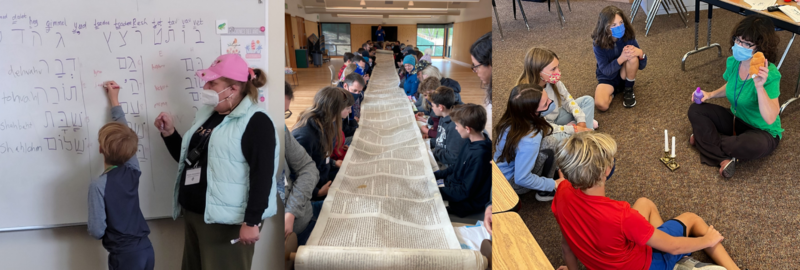Youth Hebrew Learning
Youth Hebrew Learning

Beth Am is a part of an innovative new approach to Hebrew learning! To learn more, read A Different Type of Hebrew School by Sarah Lauing Cohen, Director of Learning and Educational Innovation.
Hebrew learning at Beth Am follows a “sound-to-print” approach, introducing the sounds of Hebrew early, by integrating it in Hebrew-rich Youth Education programs for all our Pre-K through 5th graders. Once they have an aural and oral foundation in Hebrew, students have a choice of when and how they learn to read Hebrew:
|
TRACK 1: Onward Hebrew |
TRACK 2: Basic Modern Hebrew |
|
PreK-4th Grade Occurs during Sunday Program, Hagigah or Chavurah. No additional registration is required. |
3rd-4th Grade Sundays 11:45 AM to 12:30 PM OR as Individual Tutoring. |
|
5th Grade Weekdays on Zoom OR as Individual Tutoring. *Additional registration is ONLY required for tutoring. |
5th Grade Weekdays on Zoom OR as Individual Tutoring. |
|
6th-7th Grade Sundays 9:00 - 10:00 AM OR as Individual Tutoring. |
|
Beit Midrash Sundays 9:00 - 10:00 AM Read more about our Beit Midrash and B’nei Mitzvah preparation programs. |
Goals
- Hebrew is the language of our sacred texts, prayers and rituals, the state of Israel, and the shared vehicle for communication among all Jews.
- The study of Hebrew engenders connections with Judaism and the Jewish community everywhere.
- Through learning Hebrew at Congregation Beth Am, students develop a Jewish cultural literacy which deepens their Jewish identity and helps contextualize Jewish values, history, and ritual.
- Hebrew learning prepares our young people for active participation in Jewish life, from home holiday observances to milestones like B’nei Mitzvah to prayer spaces they will encounter throughout their adult lives.
OBJECTIVES
- Identify the names and sounds of Hebrew letters
- Decode, meaning to sight-read syllables and words
- Feel confident in their Hebrew decoding skills
Prayer Competency
- Read and chant prayers for Shabbat morning and
evening and home blessings - Understand key words and themes in Jewish rituals and prayer (Baruch atah Adonai, siddur, etc.)
- Feel confident in prayer spaces
- Value Hebrew as a sacred language
Cultural Literacy
- Use important Jewish words and phrases in Hebrew as part of their Jewish lives (e.g. shanah tovah, haggadah, mazel tov)
- Understand key modern Hebrew words in conversation ( e.g. todah/ thank you)
- Sing Hebrew songs
- Value Hebrew as a relevant part of their Jewish identity
Wed, October 22 2025
30 Tishrei 5786
Youth Education Schedule
-
Sunday ,
OctOctober 26 , 2025 Music with Mimi
Music with Mimi
Sunday, Oct 26th 9:45a to 10:30a
Come and join Mimi for her new class at Beth Am "Music with Mimi". Participants will enjoy songs, music, dancing, movement, puppets, stories, parachute, bubbles, and more! -
Sunday ,
NovNovember 2 , 2025 Music with Mimi
Music with Mimi
Sunday, Nov 2nd 9:45a to 10:30a
Come and join Mimi for her new class at Beth Am "Music with Mimi". Participants will enjoy songs, music, dancing, movement, puppets, stories, parachute, bubbles, and more! -
Sunday ,
NovNovember 9 , 2025 Music with Mimi
Music with Mimi
Sunday, Nov 9th 9:45a to 10:30a
Come and join Mimi for her new class at Beth Am "Music with Mimi". Participants will enjoy songs, music, dancing, movement, puppets, stories, parachute, bubbles, and more! -
Sunday ,
NovNovember 9 , 2025BATY Bowling
Sunday, Nov 9th 12:30p to 2:30p
-
Friday ,
NovNovember 21 , 2025 Zimriyah Jr. Choir Rehearsals
Zimriyah Jr. Choir Rehearsals
Friday, Nov 21st 5:00p to 6:15p
Zimriyah Jr. Choir rehearsals will be held on Fridays prior to the Erev Shabbat services. All kids are welcome! -
Sunday ,
DecDecember 7 , 2025 Chanukah Craft Bazaar
Chanukah Craft Bazaar
Sunday, Dec 7th 11:30a to 2:00p
The Chanukah Craft Bazaar will provide holiday shoppers seeking unique and locally crafted gifts with an opportunity to support local artisans. Beth Am Congregants as well as third-party vendors will be showcasing their talents through the sale of photography, paintings, glass, jewelry, pottery, and more, -
Saturday ,
DecDecember 13 , 2025 BATY Limos and Latkes
BATY Limos and Latkes
Motzei Shabbat, Dec 13th 6:00p to 10:00p
Join fellow Beth Am teens for a progressive Chanukah dinner! We'll ride in style on a PARTY BUS, stopping at the homes of generous BATY members to enjoy some fried food dinner courses! -
Friday ,
DecDecember 19 , 2025 Zimriyah Jr. Choir Rehearsals
Zimriyah Jr. Choir Rehearsals
Friday, Dec 19th 5:00p to 6:15p
Zimriyah Jr. Choir rehearsals will be held on Fridays prior to the Erev Shabbat services. All kids are welcome! -
Friday ,
JanJanuary 30 , 2026 Zimriyah Jr. Choir Rehearsals
Zimriyah Jr. Choir Rehearsals
Friday, Jan 30th 5:00p to 6:15p
Zimriyah Jr. Choir rehearsals will be held on Fridays prior to the Erev Shabbat services. All kids are welcome! -
Friday ,
FebFebruary 27 , 2026 Zimriyah Jr. Choir Rehearsals
Zimriyah Jr. Choir Rehearsals
Friday, Feb 27th 5:00p to 6:15p
Zimriyah Jr. Choir rehearsals will be held on Fridays prior to the Erev Shabbat services. All kids are welcome!
Newsletter Subscriptions
Congregation Beth Am | 26790 Arastradero Road | Los Altos Hills, CA 94022 | (650) 493-4661
 We strive to live as a holy community whose study and practice of Judaism inspires and challenges us to "do justice, to love kindness and to walk humbly with our God" (Micah 6:8).
We strive to live as a holy community whose study and practice of Judaism inspires and challenges us to "do justice, to love kindness and to walk humbly with our God" (Micah 6:8).
Privacy Settings | Privacy Policy | Member Terms
©2025 All rights reserved. Find out more about ShulCloud






